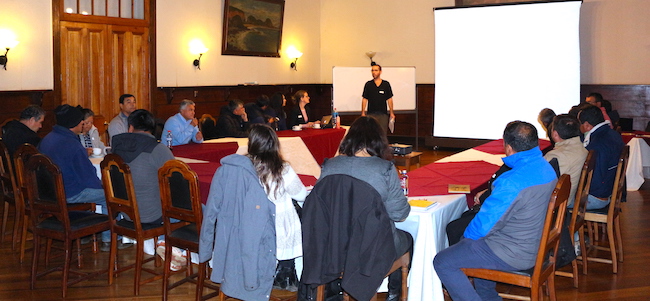
Over the last year, Future of Fish has been working through a co-design process with four Chilean artisanal hake caletas, leading them through idea development, business modelling and most recently to the finalisation of business plans. Last month we brought everyone together in Valparaiso, to discuss our cross-caleta learnings and plan our next steps.
Working with four caletas in different locations (El Quisco, Duao, San Antonio and San Pedro Concon) and a group of open air market vendors (mostly from Santiago) means that Future of Fish and our partners at ECOS and APPChile have a birds eye view of the proceedings, allowing us to notice the similarities and crossover between the conversations in each syndicate. Now that we’re moving out of the idea development phase towards project implementation, it seemed like an ideal time to bring the caletas and vendors together to discuss learnings and share knowledge across the groups, and to activate spaces for action.
In Valparaiso late May, we brought together members of each caleta and the open air market vendors group, with the following objectives:
- Allow fishers and vendors to share the ideas that they developed through the co-design process;
- Allow fishers from different caletas and vendors to understand the common issues and barriers that exist across groups;
- Deepen the relationship and trust between the fishing syndicates and the open air market vendors;
- Create space for fishers and open air vendors to discuss and identify larger system wide interventions which may be feasible, and to identify the role which each group can play in these types of interventions;
- Identify a set of next steps for coordination between and amongst parties present: fishers, open air vendors, Future of Fish, and ECOS.
We went into the cross caleta workshop with a full agenda, but also an openness to the needs and priorities of the workshop participants. Caleta members and open air market vendors brought their own perspectives and goals for the workshop, along with some pushback and strong opinions. After months of planning, scoping, and meeting, the feeling in the room was excited but also frustrated: the fishers and vendors wanted more action and less talking. We moved through agenda items quickly and dived into the juicy conversation, hashing out strategies for moving towards a deal or other tangible transactions between the fisher syndicates and the open air vendors. The caletas are ready to act now to build direct relationships with vendors, and the conversation quickly turned to prices, product availability, the potentiality of prioritizing artisanal over industrial products, and ways to bypass the central terminal and build direct, long-term, loyal relationships.
We came away from the workshop with a plan. In the coming weeks there will be a push towards beginning direct transactions between fishers and the end of the supply chain, with fishers from one or more of the partners syndicates sending fish directly to the open air vendors in Santiago without a middleman involved. There are still many considerations to be taken into account, including managing logistics, quality, volumes, prices, contracts, verification of legality and more. Future of Fish, APPChile and ECOS will be supporting this process from the sidelines, helping where possible and providing advice about the logistics and operationalization of these test runs.
We’re clear that implementing direct sales from fishers to vendors is not going to be plain sailing: processes need to be developed and unexpected problems will arise. These are the healthy risks of our Fishery Development Model co-design approach, and we’re excited to get started. We hope that seeing some action evolve from the ideas we co-developed over the last months will make the long process of co-design and planning and discussing feel worthwhile to all participants. Watch this space! Hopefully our next update will be to report insights from the initial transactions, some first hand testimonials of a new process, and even some happy customers.




